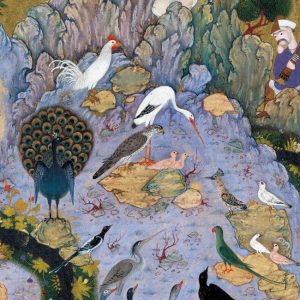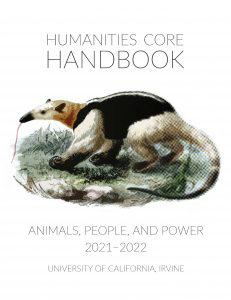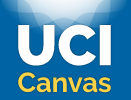
This quarter, we explore how animal figures have been used to understand what it means to be human. By tracking beasts through ancient tales, medieval manuscripts, and Renaissance drama, what can we learn about the politics and belief systems of the premodern world? Do our ideas of a “natural” hierarchy inform the power structures of our social world, or vice versa?
Animals, People, and Power
What is an animal? How much of what we know about the natural world actually comes from reality, and how much is a projection of human concerns onto other living things? When we represent animals in art, literature, or scientific discourse, what kinds of boundaries between “humanity” and “animality” are drawn? Why are those boundaries so often transgressed or transformed? What kind of cultural or political work is performed when we compare animals to people, or people to animals?
Writing
Prompts
Research
Help
Writing
Center
UCI
Support
REQUIRED MATERIALS F2021
Important: The course requires the specific editions and translations listed. All additional reading assignments will be provided to students in PDF format.
 Beauchamp, Tamara, ed. Humanities Core Handbook: Animals, People, and Power 2021–2022. XanEdu, 2021. ISBN: 9781711494609 [Available only through UCI’s bookstore, for use in all three quarters of the course]
Beauchamp, Tamara, ed. Humanities Core Handbook: Animals, People, and Power 2021–2022. XanEdu, 2021. ISBN: 9781711494609 [Available only through UCI’s bookstore, for use in all three quarters of the course]
Marie de France. Fables. Translated and edited by Harriet Spiegel. University of Toronto Press, 1994. [Either print book (ISBN: 9780802076366) or e-book (ISBN: 9781487526900) is acceptable.]
Ovid. Metamorphoses. Translated by Rolfe Humphries. Annotated by Joseph D. Reed. Indiana University Press, 2018. [Either print book (ISBN: 9780253033598) or e-book (ISBN: 9780253034496 or 9780253033703) is acceptable. Available online through UCI Libraries, on-campus or VPN (UCIFull) access required.]
Shakespeare, William. A Midsummer Night’s Dream. Edited by Wolfgang Clemen. Signet Classics, 1998. ISBN: 9780451526960
LECTURE OVERVIEW
 Prof. Rebecca Davis (Dept. of English) will lecture on medieval bestiaries and the Vulgate Bible, beast fables and a werewolf story by Marie de France, riddles from the Exeter Book, and selections from Reynard the Fox.
Prof. Rebecca Davis (Dept. of English) will lecture on medieval bestiaries and the Vulgate Bible, beast fables and a werewolf story by Marie de France, riddles from the Exeter Book, and selections from Reynard the Fox.
Weeks 1-4
 Prof. Julia Lupton (Dept. of English) will lecture on Chaucer’s The Nun’s Priest’s Tale, Ovid’s Metamorphoses, and Shakespeare’s A Midsummer Night’s Dream.
Prof. Julia Lupton (Dept. of English) will lecture on Chaucer’s The Nun’s Priest’s Tale, Ovid’s Metamorphoses, and Shakespeare’s A Midsummer Night’s Dream.
Weeks 4-7
 Prof. Nasrin Rahimieh (Dept. of Comparative Literature and Humanities Core Program) will lecture on Kalila wa Dimna, Zakani’s Gorby and the Rats, and Attar’s Conference of the Birds.
Prof. Nasrin Rahimieh (Dept. of Comparative Literature and Humanities Core Program) will lecture on Kalila wa Dimna, Zakani’s Gorby and the Rats, and Attar’s Conference of the Birds.
Weeks 8-10
WRITING OVERVIEW
In seminars, students will be guided through the transition between high school and college-level writing and communication. They will build a basic website for ongoing multimodal projects, conduct a rhetorical analysis of a medieval animal fable, and write a literary analysis of A Midsummer Night’s Dream.
MORE INFORMATION
Students in Humanities Core enroll in a lecture and in a corresponding writing seminar.
 Enrolled students will find details about the lectures and special events on the UCI Canvas site for lectures, and each writing seminar will have a UCI Canvas site with a seminar syllabus.
Enrolled students will find details about the lectures and special events on the UCI Canvas site for lectures, and each writing seminar will have a UCI Canvas site with a seminar syllabus.
In Week 0, there will be no lectures, but seminars will meet: TuTh seminars meet for the first time on Thursday, Sept. 23, 2021, and MWF seminars meet for the first time on Friday, Sept. 24, 2021. MW seminars and HumCore BioSci discussions begin in Week 1.
Your (one) final exam will be administered by your seminar instructor during Exam Week.
Image: Detail from an illustration by Habiballah of Sava in Attar, Language of the Birds, folio 11r. Ca. 1600, Metropolitan Museum, New York. https://www.metmuseum.org/art/collection/search/451725
